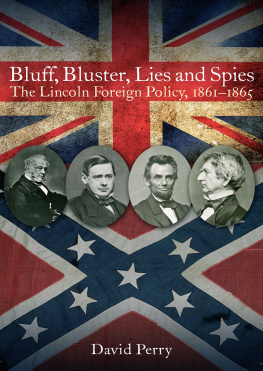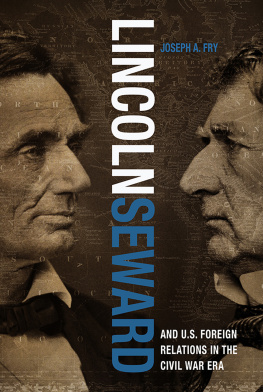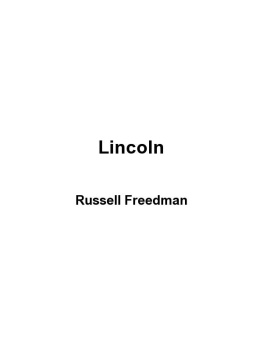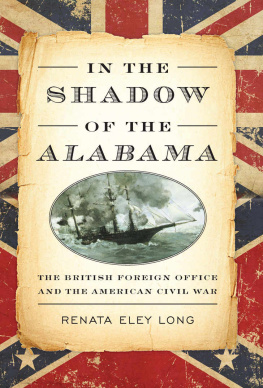BLUFF, BLUSTER, LIES AND SPIES
The Lincoln Foreign Policy, 18611865
David Perry

Philadelphia & Oxford
Dedicated to Dr. Francelia Butler
Professor of English, University of Connecticut
and
Jane Marjorie Perry
PREFACE
More often than not, the story of the American Civil War is about generals and battles. Foreign policy and diplomacy are often given much less attention. With this in mind, I started my research to find out if there was a foreign policy during the Lincoln administration, and if so, how effective it was.
I first became interested in the topic of diplomacy and foreign relations during the American Civil War when reading William Henry Sewards Some Thoughts for the Presidents Consideration. Contemporary historians like Doris Kearns Goodwin tell us that Seward gets high marks for his work as secretary of state. When she didnt adequately explain why he earned those good grades, I decided to look further. Sewards contemporary, Charles Francis Adams, believed that the secretary saved the Union through his skillful handling of the 1861 Trent Affair. On the other hand, British prime minister Lord Palmerston thought Seward was a vaporing, blustering, ignorant man. So, who was William Henry Seward, and why have most historians given the secretary of state a free pass? Didnt he threaten to wrap the world in flames over European talk of recognition of the Confederate States of America? I wondered if those threats had any material impact on the conduct and outcome of the war, or was this just posturing that was recognized as such and ignored by the powerful men of the Foreign Office and the Tuileries? Did anyone else get a free pass? My research began with Seward and the Lincoln State Department, but quickly led South to people like Sewards counterpart in the Confederate State Department, Judah Philip Benjamin and his boss, Jefferson Davis. Like Seward, Benjamin was mistrusted and vilified in the press. He was both the dark prince and the brains of the Confederacy. However, Seward published his official correspondence, and saved his private letters. The Rush-Rhees library contains almost 50,000 Seward communication items.
Unfortunately, Benjamin burned all of his personal papers after the war. With less evidence to help evaluate his work, how can we better understand the part people like Judah Benjamin played in Confederate foreign relations?
One of the complications in analyzing Confederate foreign relations at this time is the fact that President Jefferson Davis initially did not have a foreign policy. On the one hand, he believed that cotton was his best choice for commissioner to Europe. On the other, he still needed guns to fight the Yankees and clear his harbors of the Union ironclads that stood in his way. Without recognition as a sovereign nation, the representatives of the Confederacy lacked the accreditation to be formally received by the men of the Foreign Office in either London or Paris. No matter. As secretary of war under Franklin Pierce, Davis knew he needed guns first. Southern farmers and plantation masters didnt know how to make them, but Northern gunsmiths did. So, Davis first ministers to Europe were a small group of purchasing agents whose job it was to get there before Union representatives and buy as many guns as they could. Dont bother with old smoothbores that Europe was trying to unload. Just get the better rifled guns like Lincoln had from Springfield. As the war dragged on, I could begin to analyze the impact of a more organized and formal Confederate State Department structure on the European Foreign Office. Most of this, however, came too late.
Beyond Union and Confederate ministers, consuls and purchasing agents, what part did international law play at that time? Lord John Russell of the London Foreign Office was guided by the two leading exponents of international law: Emmerich de Vattel and Henry Wheaton. He and the Crown law officers also paid attention to the Admiralty judgments of William Scott, the First Baron Stowell. Nevertheless,Vattel, Wheaton and Stowell told him how things ideally should be. Men like Seward, Napoleon, Palmerston and many others were acting out of immediate need as dictated by sometimes novel circumstances not addressed by any of the legal experts.
The language and craft of diplomacy and diplomats, then and now, is often deliberately vague and ambiguous to be able to gain advantage and/ or deniability at a later date. Knowing the complexity of the American Civil War, I was left with the fact that this diplomatic vagueness resulted in too many questions unanswered by the existing research on Civil War foreign relations. Minister to France, William Lewis Dayton, wrote to Seward about his frustration in dealing with French diplomacy. He wrote, No man but a Frenchman would ever have thought of Talleyrands famous bon mot, that the object of language was to conceal thought.
A few of the many unanswered questions which arose during the course of research for this book include but are not limited to:
1. If we are still to believe that Britain was the most powerful nation on Earth at this time, what would have happened if she had recognized the Confederacy? Could she have backed up her actions with the force necessary to break the blockade and subdue a fully-mobilized Union army? Or was Britain a paper tiger who maintained her illusion of power by staying out of the American conflict?
2. Were people like Richard Lyons the real heroes of the diplomatic war that ultimately saved the Union? Was he in control of U.S. foreign relations?
3. Was Europe really so distracted by events at home that they paid less attention to the war in America thus doing more for the Union war effort than all of the diplomatic work at the state department?
4. If Benjamin Disraeli was correct in his assertion that Seward and Russell had a secret agreement that Britain would not break the blockade and that the Laird Rams would never leave an English port, was Seward the de facto president and hero after all? He wasnt crazy, but crazy like a fox all along?
As I began to dig deeper, I also realized that there were many unsung heroes who played significant parts in this complex drama. A good example of this is the story of the undercover agents who spied upon and frustrated Confederate activities in Europe. Thomas Haines Dudley, U.S. consul in Liverpool, is well-known and credited with being Lincolns spymaster. The reality is that Dudley was employed, supervised and paid by another, lesser-known man, Henry Shelton Sanford, U.S. minister resident to Belgium. Sanfords correspondence makes it clear that he was actually in charge of the surveillance, intelligence and arms purchasing operations for Lincoln in Europe.
The vital role played by diplomacy and foreign relations during the American Civil War has been well documented by earlier historians like Lynn Case and Warren Spencer as well as more recent historians like Amanda Foreman and Howard Jones. Bluff Bluster, Lies and Spies does not attempt to cover the broad, complex entirety of foreign relations during the American Civil War. Most researchers have focused on a short, ten-month period from March 4, 1861 to the settling of the Trent crisis in December, 1861. Issues with Mexico and Napoleon III are not ignored, but given much less attention. Rising tensions and a shooting war were also erupting in Japan that are not often addressed. At the same time that the Alabama and Kearsarge were battling off Cherbourg in the summer of 1864, Robert Pruyn, U.S. minister to Japan, warned Seward that war with that country might break out at any moment.
Next page





